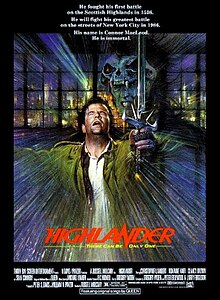
Back Highlander (cinta) AN ساكن الجبال (فيلم) Arabic ساكن الجبال ARZ Els immortals Catalan Highlander (film) Czech Highlander Welsh Highlander Danish Highlander – Es kann nur einen geben German Highlander (película) Spanish Highlander (filma) Basque
| Highlander | |
|---|---|
 Theatrical release poster | |
| Directed by | Russell Mulcahy |
| Screenplay by |
|
| Story by | Gregory Widen[1] |
| Produced by |
|
| Starring | |
| Cinematography | Gerry Fisher[2][3] |
| Edited by | Peter Honess[1] |
| Music by | Michael Kamen[1] |
Production companies |
|
| Distributed by |
|
Release dates |
|
Running time | 111 minutes[1] |
| Countries | |
| Language | English |
| Budget | $19 million[7] |
| Box office | $12.8 million[8] |
Highlander is a 1986 British-American fantasy action-adventure film directed by Russell Mulcahy from a screenplay by Gregory Widen, Peter Bellwood, and Larry Ferguson. It stars Christopher Lambert, Roxanne Hart, Clancy Brown, and Sean Connery. The film chronicles the climax of an age-old war between immortal warriors, depicted through interwoven past and present-day storylines. It is the first film in the Highlander franchise.
Connor MacLeod (Lambert) is born in the Scottish Highlands in the 16th century. After being mortally wounded by the murderous Kurgan (Brown) in battle, he makes a seemingly miraculous recovery and is banished from his village under suspicion of witchcraft. Five years later, MacLeod is found by swordsman Ramírez (Connery), who trains him in swordplay and explains that they and others were born immortal, invincible unless beheaded. Immortals wage a secret war, fighting each other until the last few remaining will meet at the Gathering to fight for the Prize. In 1985, the Gathering is finally happening in New York City, and MacLeod must ensure that the Prize is not won by the Kurgan.
Highlander was a commercial failure on its initial theatrical release, grossing only a little less than $13 million worldwide against a production budget of $19 million, while receiving mixed reviews. Nevertheless, it became a cult film and inspired several film sequels and television spin-offs. The rock band Queen recorded several songs for the soundtrack, with "Princes of the Universe" also used for the title sequence in the television series.[9][10] The tagline, "There can be only one", has carried on into pop culture.
- ^ a b c d e f g Pulleine, Tim (August 1986). "Highlander". Monthly Film Bulletin. Vol. 53, no. 631. British Film Institute. pp. 236–237.
- ^ a b c "HIGHLANDER (1986)". British Film Institute. Archived from the original on March 9, 2016.
- ^ a b c d "Highlander (1986)". AFI Catalog. American Film Institute.
- ^ "Highlander (1986)". BBFC. Archived from the original on April 11, 2021. Retrieved April 11, 2021.
- ^ "Avoriaz Fantasy Film Fest Skeds 4 World Premieres". Daily Variety. January 8, 1986. p. 15.
- ^ "Highlander (1986)". European Audiovisual Observatory.
- ^ Andrew Yule, Hollywood a Go-Go: The True Story of the Cannon Film Empire, Sphere Books, 1987 p138
- ^ "Highlander". The Numbers. Archived from the original on April 7, 2015. Retrieved April 16, 2015.
- ^ "Highlander: 35 years since Scotland stole the show in cult film starring Queen, Sean Connery, and Christopher Lambert". Press and Journal. Archived from the original on November 24, 2020. Retrieved November 25, 2020.
- ^ Cite error: The named reference
Title sequencewas invoked but never defined (see the help page).